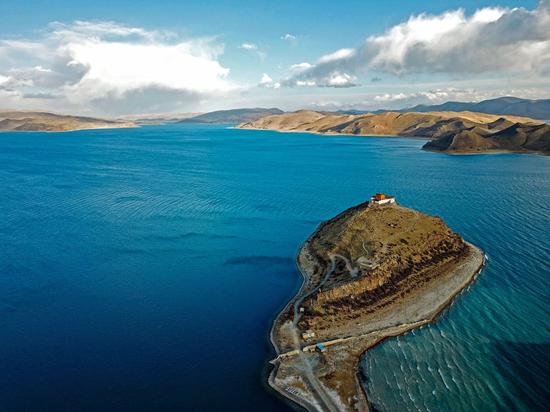

Aerial photo taken on April 16, 2022 shows the scenery of the Yamzbog Yumco Lake in Shannan, southwest China's Tibet Autonomous Region. Known as "the roof of the world," southwest China's Tibet Autonomous Region is deemed the "water tower" of Asia, a climate regulator and gene pool of the planet Earth. (Xinhua/Jiang Fan)
Rapid climate warming has caused water imbalances in the Third Pole region, leading to greater water demand in densely populated downstream countries, according to a new study.
With the largest global store of frozen water after the Antarctic and Arctic, the Third Pole region, located in the Qinghai-Tibet Plateau, is home to headwaters of over ten major Asian rivers. It has been known as the "Asian Water Tower" for providing a reliable water supply to almost 2 billion people. But an article published this week in the journal Nature Reviews Earth & Environment says that the region has gotten out of balance between solid water in glaciers and liquid water in lakes and rivers under the global climate change impact.
The rise in temperatures with changes in the westerlies and the Indian monsoon led to glacier retreat and more precipitation in the region's northern part and less in the southern. The spatial imbalance will alleviate water scarcity in the Yellow and Yangtze River basins while increasing scarcity in the further-south Indus basins, noted the study.
"Such imbalance will likely pose a great challenge to the supply-demand balancing of water resources in downstream regions," said Yao Tandong, lead author of the study and an academician at the Chinese Academy of Sciences.
The highest water demand is projected to be in the Indus basin, said Walter Immerzeel, co-author of the study and a researcher at Utrecht University in the Netherlands. He stressed that this demand would affect irrigation, accounting for more than 90 percent of water use across the area.
"Since this north-south disparity is expected to be amplified by climate warming in the future, adaptation policies for sustainable water resource management are greatly needed in downstream countries," said co-author Piao Shilong, also a researcher at Peking University.
The scientists in the study said they still need more information to help the public respond to the changes, such as comprehensive monitoring stations in data-scarce areas. They also call for collaboration between upstream and downstream countries. (Xinhua)

86-10-68597521 (day)
86-10-68597289 (night)

52 Sanlihe Rd., Xicheng District,
Beijing, China (100864)

